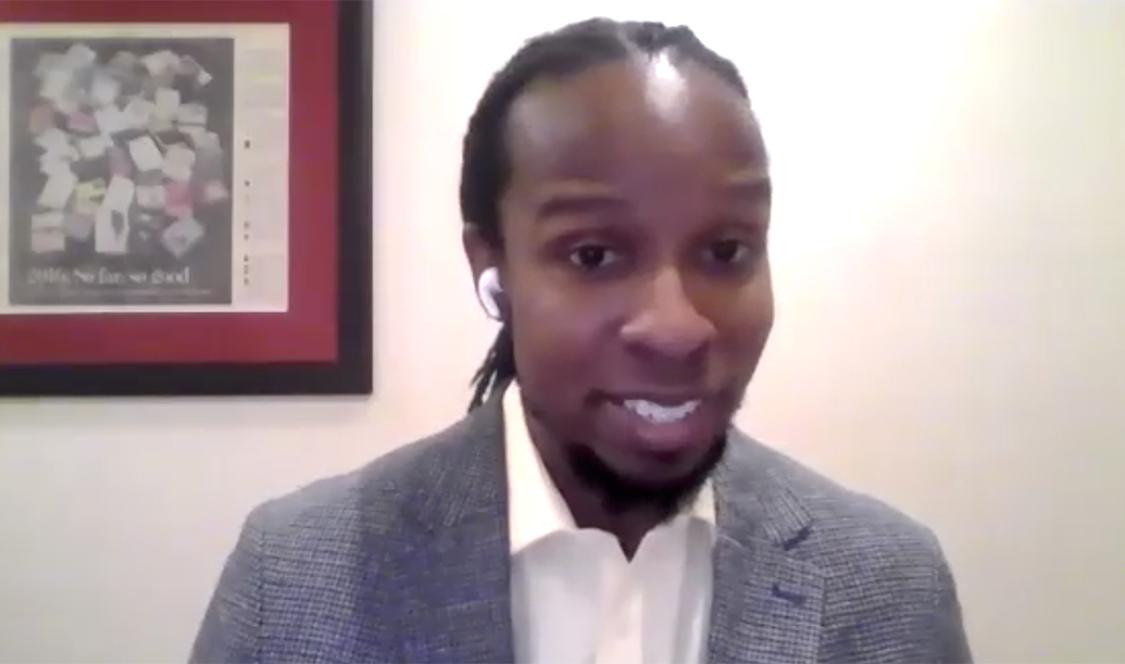Ibram X. Kendi would like to banish the term “not racist” from our vocabulary. The historian, scholar, and writer said it is important for people challenging inequities to actively become antiracist and not merely “not racist.” The reason, he said, is that progenitors of racist ideas have always self-identified their ideas as “not racist.”
Coming as the Black Lives Matter movement takes root across the nation, the second speaker in this fall’s Marian Miner Cook Athenaeum lineup could not have been more compelling and timely. Being virtual, the talk also reached an outsized audience of more than 700 CMC students, faculty, alumni, and parents throughout the world.
“How To Be An Antiracist: A Conversation with Ibram X. Kendi” was moderated by the three 2020-21 Woolley Fellows: seniors Chris Agard, Will Frankel and Nandeeni Patel. After being interviewed by the trio, Kendi answered questions from the far-flung CMC audience.
Kendi, a National Book Award winner, Guggenheim Fellow and current Frances B. Cashin Fellow at Harvard University, as well as director of the Center for Antiracist Research at Boston University, said the audience for his 2019 book, also titled How to Be an Antiracist, is open-minded people of all races, ideologies and backgrounds willing to reflect on themselves and their society.
Kendi believes that too many people view a particular racial group as a problem, not understanding that the real problem is structural policies that disadvantage racial groups. Kendi advised students to become antiracial by starting in their own backyards.
“People need to look at the racial inequities in your institution and your community and ask why the disparities exist,” he said. “The answer is going to be a series of racist policies that are interconnected. Structural racism is the problem - not people.”
Kendi said he was inspired to study racism by the student activists of the 1960s who called out scholars and described black culture as pathological.
His doctoral dissertation, The Black Campus Movement: Black Students and the Racial Reconstitution of Higher Education 1965-1972, was later published as a book.
The Black Lives Matter movement and spotlight on policing has brought greater attention to Kendi’s work and others writing about racism. About our criminal justice system, Kendi said this:
“We criminalize poverty, we criminalize blackness, we criminalize immigration and on and on down the line. Then we wonder why we have the largest incarcerated population in the world by far. We imagine that police and prisons actually have the capacity to reduce crime.
“We need to recognize that policing in this country has always been violent, always been brutal…. When people say we need to abolish the police, what they’re really saying is we need to abolish brutality.”
Every single person has the power to resist racism, he told the audience, and especially encouraged students to use that power. When Kendi was asked for advice on if students should talk to their parents about antiracism, he urged them to have the conversations, even though they might be difficult. “You have the greatest chance to change the minds of your parents than anyone on earth.”
Kendi said the racial problem he would want to tackle first on the federal level is health disparities, which people are seeing firsthand with the Covid-19 crisis. “I would advocate for policies that provide free, high quality health care for every single person.”
Asked about the election, he said it is going to hinge on what he calls “the other swing voters.” These are not older white voters who switch between voting Democrat and Republican, but rather younger people of color who swing between voting Democratic and not voting, or voting for a third party. These “political free agents” are not political cattle to be driven to the polls, he said, but individuals who need to be persuaded to vote with policies and candidates that appeal to them.
Although firmly entrenched, racism should not be considered intractable or permanent, Kendi said. “Racism is a modern phenomenon. It’s really only lived 500 years, and humans have been civilized for upwards of 5,000 years.
“It’s an intellectual copout to imagine that this system that has brought so much death and misery and pain to so many people is always going to be there. Even if the odds are completely against us, as they certainly are, we still have to be fighting to transform and build a new world.”
In his parting words, he urged the CMC viewers to be antiracist. “Figure out ways to be courageous,” he said. “Courage isn’t the absence of fear, but the strength to do what’s right in the face of it.”
-Allison Engel

